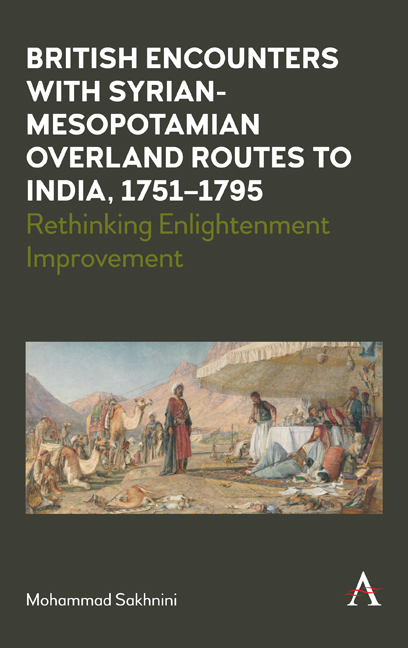 British Encounters with Syrian-Mesopotamian Overland Routes to India, 1751-1795
British Encounters with Syrian-Mesopotamian Overland Routes to India, 1751-1795 Book contents
- Frontmatter
- Contents
- Acknowledgment
- Introduction: Pluralising The Enlightenment: Improvement And Cross-Cultural Encounters
- Chapter One Improvement of Knowledge: John Carmichael’s A Journey From Aleppo to Busserah, Over the Desert (1772)
- Chapter Two Polite Englishman in the East: Edward Ives’s Journey from Persia to England (1773)
- Chapter Three Commerce, Virtue and Improvement: Abraham Parsons’s Travel in Asia and Africa (1808)
- Chapter Four Henry Abbott: A Cosmopolitan in Cities and Deserts
- Chapter Five Eyles Irwin’s Travels: The Politics of Adventure in the Levant
- Chapter Six Political and Moral Improvement: Donald Campbell, A Journey Overland to India Partly by A Route Never Gone Before by Any European (1795)
- Conclusion
- Unpublished Manuscripts
- Reference List
- Index
Conclusion
Published online by Cambridge University Press: 15 November 2023
- Frontmatter
- Contents
- Acknowledgment
- Introduction: Pluralising The Enlightenment: Improvement And Cross-Cultural Encounters
- Chapter One Improvement of Knowledge: John Carmichael’s A Journey From Aleppo to Busserah, Over the Desert (1772)
- Chapter Two Polite Englishman in the East: Edward Ives’s Journey from Persia to England (1773)
- Chapter Three Commerce, Virtue and Improvement: Abraham Parsons’s Travel in Asia and Africa (1808)
- Chapter Four Henry Abbott: A Cosmopolitan in Cities and Deserts
- Chapter Five Eyles Irwin’s Travels: The Politics of Adventure in the Levant
- Chapter Six Political and Moral Improvement: Donald Campbell, A Journey Overland to India Partly by A Route Never Gone Before by Any European (1795)
- Conclusion
- Unpublished Manuscripts
- Reference List
- Index
Summary
He who knows others is wise;
He who knows himself is enlightened.
—Laozi (Sixth century BC)Mirza Abu Taleb Khan was born in 1752 in Lucknow to a family with Persian and Turkish roots. His father served as an assistant to Mohammed Culy Khan, the nephew of Abul Mansur Khan, better known as Safdar Jung who served as the nawab of Oudh (now Awadh) in the Mogul court between 1739 and 1754. Abu Taleb rose to be the Aumildar (tax collector) of Etawah and several other districts under the government of Asaf-ad-Daula (1748–1797), the nawab of Oudh. But after Asaf-ad-Daula died, Abu Taleb’s life in Oudeh radically changed. The new nawab, Hyder Beg Khan, turned against him because of an old rivalry between him and Abu Taleb. In this new political development in Oudh, Abu Taleb found himself unemployed and unable to provide for his family: ‘all my dependents and adherents, seeing my distress, left me, and even some of my children […] abandoned me. I was quite overcome with grief and despondency’ (Khan 1810: I, 5). At this point in his life, he tried to find patronage and employment in the East India Company (EIC), relying on his friendship with influential British officials such as Lord Cornwallis and Sir John Shore. But they did nothing for him apart from floating the idea that the EIC might offer him a position as a Persian and Arabic instructor to its civil servants.
His Scottish friend David Richardson, an officer in the EIC, convinced him to travel to Europe and offered to bear all the costs of the journey. Abu Taleb accepted the offer. On his way to Britain in 1799, he stopped at Cape Town in South Africa and visited Dublin and Cork before reaching London where he stayed until June 1802. On the way back, Abu Taleb visited Paris, Genoa, Istanbul, Diarbekar, Mosul, Baghdad and Basra where he joined an EIC ship departing for India. He wrote a travel account about his journey to Europe by sea and back to India overland. The Persian manuscript was circulated originally among his friends and acquaintances upon his return to India in 1803.
- Type
- Chapter
- Information
- British Encounters with Syrian-Mesopotamian Overland Routes to India, 1751-1795Rethinking Enlightenment Improvement, pp. 219 - 226Publisher: Anthem PressPrint publication year: 2023
